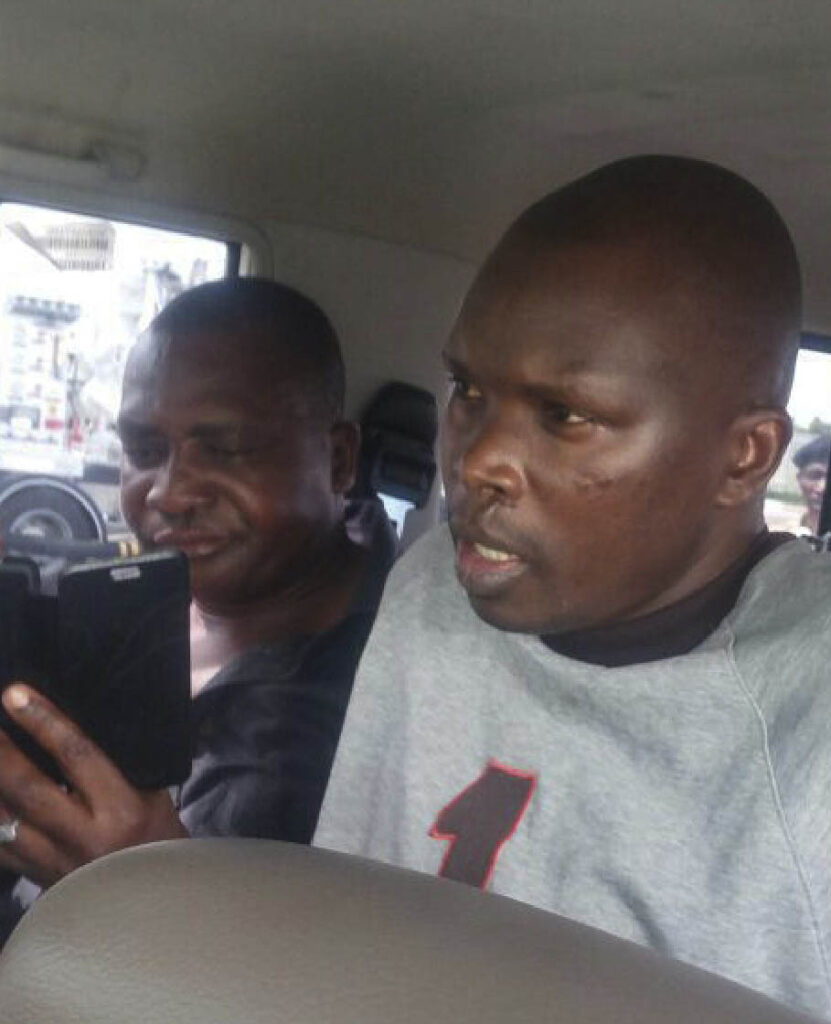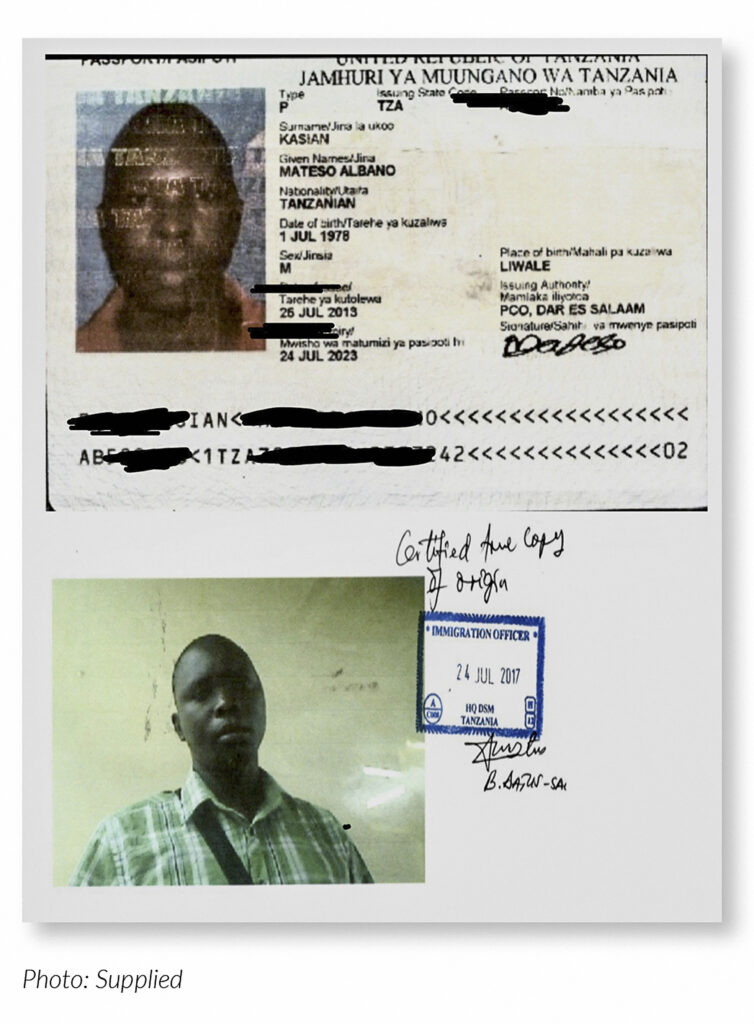Victims of greed: Elephants are targets for poachers such as Mathew ‘Shetani’ Malyango. Photos: Alastair Nelson and Terra Mater Factual Studios
Developments in two major ivory trafficking cases in Tanzania are not what conservationists might have hoped for. The conviction of Boniface Mathew Malyango, known as “Shetani Hana Huruma” (“the Devil has no mercy” in Kiswahili), was hailed by conservation organisations as a victory in 2017, with one of East Africa’s most notorious illegal ivory traders. However, his conviction was quietly overturned in mid-2020 — a development that was largely unreported in the press.
Likewise, Mateso “Chupi” Kasian was extradited from Mozambique to Tanzania in 2017 to face prosecution in what was, at the time, seen as a major victory for regional co-operation against wildlife trafficking. However, his prosecution only led to a fine of $215 — a small sum compared to the enormity of the trafficking operation he supposedly controlled.
 Boniface Mathew Malyango, known as “Shetani Hana Huruma”
Boniface Mathew Malyango, known as “Shetani Hana Huruma”
Both cases highlight the significant challenges that major wildlife trafficking investigations often face, including corruption, delays in prosecution and poor evidence handling. Support and political pressure from international partners and NGOs have primarily focused on arrests and initial prosecutions, rather than on the follow-up to legal cases.
The Shetani case
Shetani became globally renowned as a result of the Leonardo DiCaprio-produced documentary The Ivory Game. He was reputed to have killed or ordered the killing of up to 10 000 elephants, and to have controlled poaching gangs in Tanzania, Burundi, Mozambique, Zambia and southern Kenya.
He was arrested with his two brothers in October 2015 in Tanzania and convicted in 2017 on charges of “leading organised crime” and “unlawful dealing in government trophies”. The particulars of the case charged Shetani with collecting, transporting and selling 118 elephant tusks worth almost $1-million. He and his brothers were sentenced to 12 years in prison.
Conservation NGOs welcomed Shetani’s conviction as a sign that Tanzania was taking a stance on ivory trafficking. “This prosecution sends out a strong message that Tanzania’s authorities are taking [poaching] seriously and are working to eliminate poaching in the country,” said Amani Ngusaru, WWF-Tanzania country director, in a statement at the time.
However, in a judgment on 18 June 2020, the Court of Appeal of Tanzania in Dodoma quietly quashed the convictions of Shetani and his brother, Lucas Mathayo Malyango. There was almost no media coverage of the appeal case.
The initial prosecution had relied on three key pieces of evidence: a confession that Shetani made to police officers upon his arrest that he was involved in the ivory trade; a caution statement where he again confessed to police and described how he used special compartments in his modified cars to transport pieces of ivory; and physical evidence taken from Shetani’s car, in which a whitish substance had been found that was determined by a sniffer dog and then by chemical analysis to be ivory shards.
In an appeal to the high court, the first appeal judge had expunged the caution statement, on the grounds that it was not properly determined and that it was given voluntarily.
The Court of Appeal judge then found that the evidence from the sniffer dog and chemical analysis of ivory shards found in the car would also have to be discounted. The chain of custody of the car had been broken, as it was searched only several hours after the car was seized, after it had been driven to a police station in Dar es Salaam.
The judge also ruled that, while Shetani’s oral confession to police was admissible evidence, it was not enough for a conviction by itself.
According to Shamini Jayanathan, a Kenya-based criminal barrister working on illegal wildlife trafficking, the appeal judgment points out several major evidential problems: a lack of forensic examinations, issues with chains of custody in key evidence, and the over-reliance on confessions. “The basics of ‘points to prove’ seem to have been missed, with no evidence adduced of key elements of the offence”, such as transport, collection or sale of the ivory, says Jayanathan.
In her view, this stems from issues with police training. “In my experience, there is very little training done on interviews of suspects and the need to build a case regardless of what a suspect may say. There are no measures of recording of interviews or codes of practice regarding treatment of suspects [and ideally, video recording of their interviews in police detention] to contradict allegations of mistreatment or pressure.” Where international support and mentoring is provided for wildlife trafficking cases, this is primarily focused on wildlife agencies and not the national police, she adds.
Shetani has since been released from custody, as his conviction has now been quashed by the highest court in Tanzania.
 Mateso ‘Chupi’ Kasian
Mateso ‘Chupi’ KasianThe Mateso case
In late November 2020, a judgment was made in an appeal case in the high court of Tanzania at Mtwara, a small port city near the Mozambique border. The appeal was filed by Tanzania’s director of public prosecutions against Mateso Kasian (also known as “Chupi”, which means “underwear” in Kiswahili), with the aim of increasing the penalty of his 2019 conviction on ivory trafficking charges.
Mateso had been sentenced to pay a fine of $215 and to forfeit two houses in Dar es Salaam and Liwale. This, the prosecutors argued, was insufficient, since the guidelines for sentencing this offence under Tanzania’s wildlife crimes legislation recommend a fine of no less than twice the value of the “trophy” or wildlife products involved: in this case, $335 000.
The judge disagreed: the ruling stated the prosecution’s case was baseless, since (despite Mateso’s long, documented history of arrests and involvement in wildlife trafficking) he had no previous wildlife trafficking convictions, he had pled guilty and because the “recommended fine” is not a mandatory sentence. Not only that, but the judge found that the original order for forfeiture of Mateso’s houses did not properly specify the properties, and so it was quashed. As such, the $215 fine remained the only penalty. The judgment did not describe the reasons why the penalty imposed differed so much from the recommended fine, even if such a fine is not “mandatory”.
The prosecution brought against Mateso was the product of years of work by Tanzanian and Mozambican investigators and conservation NGOs, investigating him for orchestrating the slaughter of thousands of elephants in Tanzania and Mozambique since 2012.
At the time, this was seen as a major victory for regional co-operation for conservation NGOs supporting wildlife trafficking prosecutions and for circumventing corruption issues. The enormity of the work involved in prosecuting Mateso is at odds with the ultimate result of his prosecution. He remains in custody pending the decision of the Court of Appeal, and the outcome of another pending case with the resident magistrate’s court at Lindi.
Lessons learned
Both Shetani’s and Mateso’s were landmark cases challenged by corruption — a challenge that continues to bedevil wildlife trafficking investigations in the region and globally.
The problems of evidence-gathering (which brought down the Shetani prosecution) have also been seen in other major cases in the region, including several in Kenya. As Jayanathan’s assessment of the Shetani appeal suggests, this may be linked to systemic issues of police training.
Both cases faced long delays in prosecution proceedings, with judgments made years after the initial arrest for criminal activity
that stretched back many years. Similar delays have been seen in other significant ivory trafficking cases in East Africa; these pose a serious challenge to prosecutors bringing credible evidence and reliable witnesses to trial.

Questions can also be raised in both cases about the penalties applied. In Tanzania, offences relating to dealing in ivory (for which both Shetani and Mateso were convicted) not only fall under wildlife conservation legislation but are also treated as “economic crimes”, following amendments to Tanzania’s Economic and Organised Crime and Control Act. The penalty under the Act for such offences is between 20 and 30 years imprisonment, yet this was not applied in either case.
Other sentences in major ivory trafficking cases in Tanzania have, however, been upheld. A judgment on an appeal of Malyango’s ivory trafficking network, judged in the same week as his own appeal, upheld the charges against his associates. Similarly, an appeal in the case of Yang Feng Glan — a notorious ivory trafficker known as “the Ivory Queen” — and her associates was struck down in its entirety in December 2019.
These cases highlight the challenges in investigating and successfully prosecuting cases against suspected organised wildlife criminals in countries with weak rule of law and entrenched corruption. The efforts required to overcome the corrupt environment and build a case that leads to an arrest and successful prosecution are immense. Yet more can be done to build the capacity of investigators and the prosecutors to build the cases more effectively, on meaningful charges, to ensure that they do not later collapse in court or on appeal. Support, observation and political pressure by civil society throughout the full legal process also plays a role.
This is an edited extract from an article that appears in the Global Initiative Against Transnational Organised Crime’s monthly East and Southern Africa Risk Bulletin